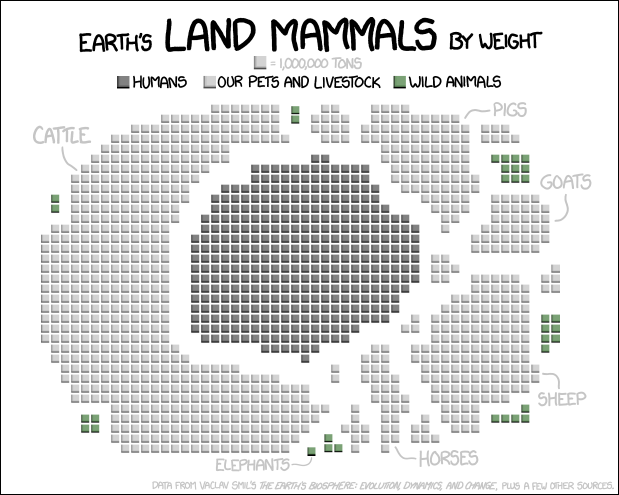this post was submitted on 23 Jul 2023
320 points (92.3% liked)
Data Is Beautiful
6891 readers
68 users here now
A place to share and discuss data visualizations. #dataviz
(under new moderation as of 2024-01, please let me know if there are any changes you want to see!)
founded 3 years ago
MODERATORS
you are viewing a single comment's thread
view the rest of the comments
view the rest of the comments

This is good, but presenting the blobs as such different shapes makes it harder to get a sense of relative size. (Obviously some of the differences are huge enough it doesn't matter, but comparing humans and cattle say.)
And which blob is chickens? I guess chickens are so much smaller and lighter than other domestic animals they don't show very big here.
It's specifically a visualization of land mammals, so chickens wouldn't appear, being birds.
Fair enough, but in a way chickens kinda should be on there anyways. They can't exactly fly very far, spend like 98% of their life on the ground, and humans breed them for food.
I think the argument was chickens not being mammals.
Ah, indeed. Still seems they should have been a bit more broad than restricting the data to land mammals, more like humans vs food.
Oh well, it is what it is.
They don't spend 98% of their life on the ground in the wild. They sleep in trees, just like turkeys and peacocks.
90%+ chickens are bred for food, I don't think there's all that many truly wild chickens out there anymore.
There are probably some somewhere, but yeah not many. However the ones that are bred for food typically weigh more.
Hell, if you let a meat chicken grow beyond its sell-by date, there's a good chance it will develop so much muscle mass it cannot stand up anymore, and it will rot to death on the spot.
I'm pretty sure they were domesticated from something (a South Asian jungle fowl, I believe) to the extent that they are no longer even the same species. So any "wild" chickens would just be feral escapees.